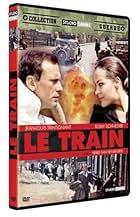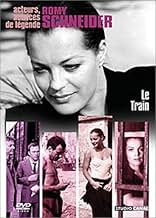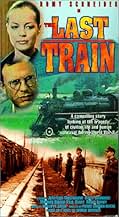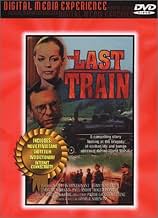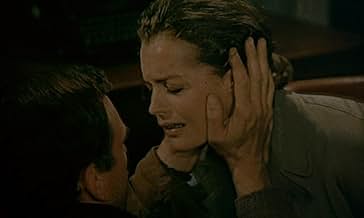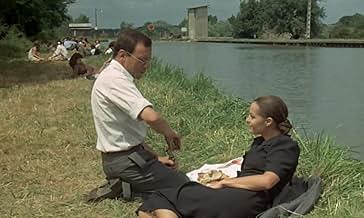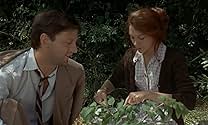IMDb-BEWERTUNG
6,9/10
1864
IHRE BEWERTUNG
Zwei Personen, ein Franzose namens Julien Marodeur und eine jüdische Deutsche (Anna Kupfer), lernen sich im Zug kennen, als sie sich auf der Flucht vor der deutschen Armee befinden, die gera... Alles lesenZwei Personen, ein Franzose namens Julien Marodeur und eine jüdische Deutsche (Anna Kupfer), lernen sich im Zug kennen, als sie sich auf der Flucht vor der deutschen Armee befinden, die gerade in Frankreich einmarschiert ist.Zwei Personen, ein Franzose namens Julien Marodeur und eine jüdische Deutsche (Anna Kupfer), lernen sich im Zug kennen, als sie sich auf der Flucht vor der deutschen Armee befinden, die gerade in Frankreich einmarschiert ist.
- Auszeichnungen
- 1 Nominierung insgesamt
Empfohlene Bewertungen
And also the most known French film about the 1940 French exodus, trying to escape from the Nazi invasion. You had EN MAI FAIS CE QU'IL TE PLAIT, back in 2015, also a very good movie, with the same settings. The other strength of this movie, besides the gripping story, is that the director Granier Deferre was only 13 years old at this time and actually lived this tragic period. So, he was the best placed to provide many of accurate details, that would probably not have been shown in another feature. For instance, those women who took advantage of the train stop, in the middle of the country side, to take a pee, in a field. Then a nazi plane arrives and bombards the area. Three seconds later after the smoke has left, we see the two cadavers of the poor women. Or the scene of a man, also taking a pee, standing between wagons, during a train stop ( of course;;;) Some folks have said that you have some lengths in the film, I agree, but in this kind of feature, lengths are sometimes unavoidable. If you had filled this film with plenty of action sequences, would that had been credible? Hell no. A memorable ending that would have made, even a Waffen SS trooper weep. Believe me.
Unusual but not terribly compelling WWII drama almost wholly set aboard a train (transporting French people fleeing from the oncoming Nazi invaders). The film's core is the budding romance between fellow passengers Jean-Louis Trintignant (whose pregnant wife and young daughter are staying in a different compartment and eventually get 'lost' along the way) and Romy Schneider, a German-Jew war widow.
Despite a busy narrative - Trintignant stepping down at every station to ask for the possible whereabouts of his family, Schneider being picked on by a group of loutish passengers in view of her aristocratic airs (meanwhile, an ageing prostitute is all-too-willing to render her services free of charge in such hard times!) and for whom the usually meek Trintignant stands up, a rather underdeveloped subplot involving young single mother Anne Wiazemsky (then still married to Jean-Luc Godard), etc. - the tone of the film is too glum and the treatment too conventional to generate much audience involvement; that said, the interspersing of black-and-white newsreels of similar events from the era was an inspired touch and the scene in which the train comes under aerial attack from the Nazis, leaving numerous victims, is nicely handled (even if the moment when a couple are mown down while relieving themselves in an open field comes off as unintentionally funny!). Besides, the film has other virtues in the pleasant countryside photography of Walter Wottitz (an expert in WWII-based films, among them John Frankenheimer's THE TRAIN [1964] - which was actually filmed in France!) and a lush score from Philippe Sarde.
An interesting moment in the film occurs when Trintignat scoffs at Schneider's recounting of how the Nazis intended to exterminate the Jewish population, which gives credence to the notion that the world only became aware of the full extent of the Holocaust after the war was over. When the train arrives at its destination, Trintignant is re-united with his family (including a new-born son) - but not before having passed off Schneider as his wife to the Gestapo officials! At the end, however, when she's captured as a member of the Resistance they're somehow able to link her back to him and the couple are brought together for questioning...
Despite a busy narrative - Trintignant stepping down at every station to ask for the possible whereabouts of his family, Schneider being picked on by a group of loutish passengers in view of her aristocratic airs (meanwhile, an ageing prostitute is all-too-willing to render her services free of charge in such hard times!) and for whom the usually meek Trintignant stands up, a rather underdeveloped subplot involving young single mother Anne Wiazemsky (then still married to Jean-Luc Godard), etc. - the tone of the film is too glum and the treatment too conventional to generate much audience involvement; that said, the interspersing of black-and-white newsreels of similar events from the era was an inspired touch and the scene in which the train comes under aerial attack from the Nazis, leaving numerous victims, is nicely handled (even if the moment when a couple are mown down while relieving themselves in an open field comes off as unintentionally funny!). Besides, the film has other virtues in the pleasant countryside photography of Walter Wottitz (an expert in WWII-based films, among them John Frankenheimer's THE TRAIN [1964] - which was actually filmed in France!) and a lush score from Philippe Sarde.
An interesting moment in the film occurs when Trintignat scoffs at Schneider's recounting of how the Nazis intended to exterminate the Jewish population, which gives credence to the notion that the world only became aware of the full extent of the Holocaust after the war was over. When the train arrives at its destination, Trintignant is re-united with his family (including a new-born son) - but not before having passed off Schneider as his wife to the Gestapo officials! At the end, however, when she's captured as a member of the Resistance they're somehow able to link her back to him and the couple are brought together for questioning...
Le train, directed by Pierre Granier-Deferre, is one of the most unknown WWII films ever made, even though it is based on a somewhat famous novel by Georges Simenon. However, Deferre wasn't interested in making a loyal adaption and especially the end differs from the original story a lot. Therefore, Deferre faced criticism and his film has sunk into oblivion, or at least in most cases, for it still has an honorable cast: Jean-Louis Trintignant (who has worked with Krzysztof Kieslowski, Francois Truffaut, Eric Rohmer and Bernardo Bertolucci), Romy Schneider (who had worked with Luchino Visconti and Orson Welles), in the leading roles; and one name worth mentioning is, as a supporting actress: Anne Wiazemsky (who has worked with Robert Bresson and Jean-Luc Godard, just to name a few).
The story starts from the summer of 1940 when a French man, Julien must leave his hometown, by train, with his wife and daughter because of the forthcoming Nazi army. In the train, Julien's wife and daughter are put to a carriage which is reserved for women, children and the elderly. In the result of this, Julien must go alone to the last carriage where he meets a group of people and notes a mysterious, Jewish German woman, Anna -- wonderfully interpreted by Romy Schneider. The film mainly focuses on their relationship and the journey to the unknown from the perspective of the last carriage.
It is a certain road-movie about a train travel during which people steal food, wash up and go to picnics. To observe war, from the perspective of a train and its people, is extremely intriguing, to say the least. For isn't train truly the milieu of our subconsciousness? In the train, our heroes are traveling to their indeterminate tragic destination, characterized by a wistful musical score. The essential idiocy of war is most clearly seen in a scene, where a group of soldiers come rampaging to the train and only succeed to, accidentally, shoot their own soldier's foot.
Le train depicts an escape from occupied France where, in turn, Francois Truffaut's The Last Metro depicts the survival and life in the occupied France. However, the connection between these two titles is entirely unintentional. The biggest flaws of Le train are in its conventional dramaturgy but it still manages to be an original film. The detailed cinematography is almost documentary-like with close-ups of train tracks; scenes of sexual intercourse, eating and washing up. Furthermore, the strength of the film is in the director's luminous idealism and faith in the force of love.
The film uses both newsreel footage and dramatizations; combines fact and fiction, like all historical films and throws the reality of war in front of our eyes. This combination means strong signal of memory; and the eternal relation between past and presence. History has always been an inexhaustible source of political rhetoric and Le train is, in fact, a leftist war film but, what is more, it achieves to relay a timeless and universal emotion of a time when man must lose his humanity, in order to survive. During times like this, moments of child-like joy are brief and transient. During times like this, it is important to love -- which might just be the thesis of this bittersweet film.
The story starts from the summer of 1940 when a French man, Julien must leave his hometown, by train, with his wife and daughter because of the forthcoming Nazi army. In the train, Julien's wife and daughter are put to a carriage which is reserved for women, children and the elderly. In the result of this, Julien must go alone to the last carriage where he meets a group of people and notes a mysterious, Jewish German woman, Anna -- wonderfully interpreted by Romy Schneider. The film mainly focuses on their relationship and the journey to the unknown from the perspective of the last carriage.
It is a certain road-movie about a train travel during which people steal food, wash up and go to picnics. To observe war, from the perspective of a train and its people, is extremely intriguing, to say the least. For isn't train truly the milieu of our subconsciousness? In the train, our heroes are traveling to their indeterminate tragic destination, characterized by a wistful musical score. The essential idiocy of war is most clearly seen in a scene, where a group of soldiers come rampaging to the train and only succeed to, accidentally, shoot their own soldier's foot.
Le train depicts an escape from occupied France where, in turn, Francois Truffaut's The Last Metro depicts the survival and life in the occupied France. However, the connection between these two titles is entirely unintentional. The biggest flaws of Le train are in its conventional dramaturgy but it still manages to be an original film. The detailed cinematography is almost documentary-like with close-ups of train tracks; scenes of sexual intercourse, eating and washing up. Furthermore, the strength of the film is in the director's luminous idealism and faith in the force of love.
The film uses both newsreel footage and dramatizations; combines fact and fiction, like all historical films and throws the reality of war in front of our eyes. This combination means strong signal of memory; and the eternal relation between past and presence. History has always been an inexhaustible source of political rhetoric and Le train is, in fact, a leftist war film but, what is more, it achieves to relay a timeless and universal emotion of a time when man must lose his humanity, in order to survive. During times like this, moments of child-like joy are brief and transient. During times like this, it is important to love -- which might just be the thesis of this bittersweet film.
I saw the film especially as admirer of Romy Schneider. I was seduced , again, by her presence and the close ups serve , in beautiful way, this cause. Her Anne , defined by bad experiences, becoming part of a story of survive and one of love, proposing a manner to resist to pressures and fears, educated , in some measure, in some form, a simple man, losting, for a period, his family, is just fair.
A war film , a trip , in the womb of a train under attacks of Nazi airplanes, a splendid scene about persecution against Jews , a great portraits of characters and inspired - dramatic end.
A beautiful film about experiences, love, refuges and radical decisions . And admirable job of Romy Schneider and Jean Louis Trintignant.
A war film , a trip , in the womb of a train under attacks of Nazi airplanes, a splendid scene about persecution against Jews , a great portraits of characters and inspired - dramatic end.
A beautiful film about experiences, love, refuges and radical decisions . And admirable job of Romy Schneider and Jean Louis Trintignant.
10myschrec
May 1940. The Germans invade France and thousands flee on trains heading for safety. A man is separated from his pregnant wife and young daughter. He meets a woman on the train and protects her. She is a German Jew -- suspected by the French -- and wanted by the Nazis.
With actual footage from WWII, this film feels more like a documentary, which of course adds to the drama. The characters -- even the minor ones -- are well drawn and evoke sympathy. Romy Schneider -- a beauty in so many other films -- displays her incredible acting prowess. And Jean-Louis Trintignant, who became well known after "Z" (1969) and "The Conformist" (1970), is incredible: low-keyed, soft-spoken and poignant. Can two people fall in love so quickly? Under such dire circumstances that keep getting worse, this strange romance seems so real.
For the most part, this is not a Holocaust film ... nor a film about Nazi atrocities. But the fear of German aggression is palpable. One character tells another -- as they see the results of the German aircraft bombing: "Close your eyes, you'll never know it happened." This is what all refugees desire -- to escape and forget. But this is a film that doesn't want you to forget the prejudice, selfishness, and other horrors of war. But it also reminds you of the gentleness and humankindness.
"It's them. I'd recognize that sound anywhere." I am reminded of the Holocaust survivor who could not sleep for years because of the sounds she heard in her dreams/nightmares.
The last seven minutes are some of the most frightening and intelligent minutes dealing with the Holocaust even put on film The scene is fraught with danger and filled with possibilities. The ethical dilemma will generate hours of thought and discussion.
With actual footage from WWII, this film feels more like a documentary, which of course adds to the drama. The characters -- even the minor ones -- are well drawn and evoke sympathy. Romy Schneider -- a beauty in so many other films -- displays her incredible acting prowess. And Jean-Louis Trintignant, who became well known after "Z" (1969) and "The Conformist" (1970), is incredible: low-keyed, soft-spoken and poignant. Can two people fall in love so quickly? Under such dire circumstances that keep getting worse, this strange romance seems so real.
For the most part, this is not a Holocaust film ... nor a film about Nazi atrocities. But the fear of German aggression is palpable. One character tells another -- as they see the results of the German aircraft bombing: "Close your eyes, you'll never know it happened." This is what all refugees desire -- to escape and forget. But this is a film that doesn't want you to forget the prejudice, selfishness, and other horrors of war. But it also reminds you of the gentleness and humankindness.
"It's them. I'd recognize that sound anywhere." I am reminded of the Holocaust survivor who could not sleep for years because of the sounds she heard in her dreams/nightmares.
The last seven minutes are some of the most frightening and intelligent minutes dealing with the Holocaust even put on film The scene is fraught with danger and filled with possibilities. The ethical dilemma will generate hours of thought and discussion.
Wusstest du schon
- WissenswertesAs Granier-Deferre had been part of the Exodus (at the age of 13), he was able to add a lot of personal observations to his description of the flight (such as people remaining cheerful despite the tragedy of the situation, nuns picking flowers in a field during a bombing raid, ...)
- VerbindungenFeatured in Romy, femme libre (2022)
- SoundtracksL'Attaque
Written and Performed by Philippe Sarde Et Orchestre
Top-Auswahl
Melde dich zum Bewerten an und greife auf die Watchlist für personalisierte Empfehlungen zu.
- How long is The Last Train?Powered by Alexa
Details
- Erscheinungsdatum
- Herkunftsländer
- Sprache
- Auch bekannt als
- The Last Train
- Drehorte
- Saincaize-Meauce, Nièvre, Frankreich(mined railroad bridge)
- Produktionsfirmen
- Weitere beteiligte Unternehmen bei IMDbPro anzeigen
- Laufzeit
- 1 Std. 35 Min.(95 min)
- Farbe
- Sound-Mix
- Seitenverhältnis
- 1.66 : 1
Zu dieser Seite beitragen
Bearbeitung vorschlagen oder fehlenden Inhalt hinzufügen

